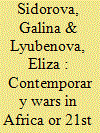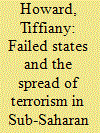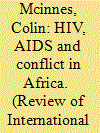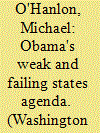|
|
|
Sort Order |
|
|
|
Items / Page
|
|
|
|
|
|
|
| Srl | Item |
| 1 |
ID:
180692


|
|
|
|
|
| Summary/Abstract |
Lately the African continent has been the focus of global attention and discussions on the present and future of Africa, especially with regards to the highly topical questions concerning the global and African state of peace and security. As multiple extremely complex armed conflicts continue to cause chronic instability and vulnerabilities in several African states and regions, they also directly affect the state of international security in the 21st century in an intensively interconnected and globalized world from an economic, political and peace/security perspective. Accordingly, this research article offers an in-depth analysis of some of the major causes and explanations of the existing wars in Africa related to the illicit exploitation of resources, vulnerability, and control. The goal of this work is to reveal and analyze the complexity of 21st-century wars in Africa and their deep interrelated causes by applying the example of the long and banal armed conflicts in the Democratic Republic of the Congo. Thus, the authors argue that the destabilization of the political and socio-economic situation in Africa, and DRC in particular, is directly connected to local and regional conflicts over access to various forms of resources, influence, and power, but also to the artificially created chaos by various interested power parties for expansion, profit, and hope for further profit. In this sense, it has been emphasized that conflicts of so-called ‘low intensity’, artificially maintained over a long period of time, pose no lesser degree of threat to the regional state of peace and security.
|
|
|
|
|
|
|
|
|
|
|
|
|
|
|
|
| 2 |
ID:
099823


|
|
|
|
|
| Publication |
2010.
|
| Summary/Abstract |
Plagued by systematic state failure, sub-Saharan Africa's failed states have helped facilitate internationally sponsored terrorist networks and operations. However, until recently, this type of activity was primarily relegated to North Africa and the Horn. But that has begun to change. Now, what was once a seemingly benign terrorist presence in sub-Saharan Africa is starting to transform into a movement, with states such as Nigeria, Sierra Leone, Liberia, and the Democratic Republic of the Congo (DRC) now lending arms, financial support, and radical militants to the extremist jihadist movement of internationally sponsored terrorist organizations such as Al Qaeda. Further, with the recent bombings in Kenya and Somalia, and the failed bombing attempt on a U.S. airliner by a Nigerian national, it is becoming increasingly evident that internationally sponsored terrorist networks have found a permanent home in sub-Saharan Africa and within the hearts and minds of its people, which poses significant challenges for the international community, given the region's patchwork of failed states, where terrorists can easily hide and thrive. Consequently, this study discusses how the conditions of state failure have fostered support for internationally sponsored terrorism in sub-Saharan Africa. Terrorist groups are now actively recruiting more militants from within the region and popular support for extremist acts is on the rise in sub-Saharan Africa. Thus, the article argues sub-Saharan Africa will soon become the site for the next generation of terrorists, and the next wave of terrorist activity.
|
|
|
|
|
|
|
|
|
|
|
|
|
|
|
|
| 3 |
ID:
102425


|
|
|
|
|
| Publication |
2011.
|
| Summary/Abstract |
The causes and consequences of HIV and AIDS are social are well as biomedical. Given the scale of the pandemic, understanding the social dimensions of HIV and AIDS is vital. One key argument is that there is a link between conflict and the spread of HIV. This appears to be particularly the case for sub-Saharan Africa where high levels of HIV prevalence are matched by violent conflict and state instability. Recent evidence however suggests that HIV prevalence does not always increase in conflict and that in some instances it may even reduce. This article attempts to explain why HIV has not increased in some sub-Saharan conflicts. To do this it moves beyond the use of risk factors to offer a new explanation based on susceptibility and vulnerability. It uses this explanation to examine four cases - Sierra Leone, Angola, Rwanda and the Democratic Republic of the Congo (DRC) - where conflict did not lead to a significant increase in the prevalence of HIV. The article concludes that, despite the fears of a few years ago, conflict does not readily act as a vector for the spread of HIV, though the potential for this to occur does still exist under certain circumstances.
|
|
|
|
|
|
|
|
|
|
|
|
|
|
|
|
| 4 |
ID:
116615


|
|
|
|
|
| Publication |
2012.
|
| Summary/Abstract |
Barack Obama has been a disciplined, pragmatic, and effective president on the urgent national security challenges of the day. His record is generally solid on matters such as managing the nation's major wars, pressuring rogue states, rebalancing the U.S. national security focus toward East Asia, and carrying out the reset policy with Russia. On balance, I would personally rate his foreign policy record through most of his first term as much better than average, with perhaps only George H.W. Bush having done clearly better at this stage among all presidents of the last half century.
|
|
|
|
|
|
|
|
|
|
|
|
|
|
|
|
|
|
|
|
|